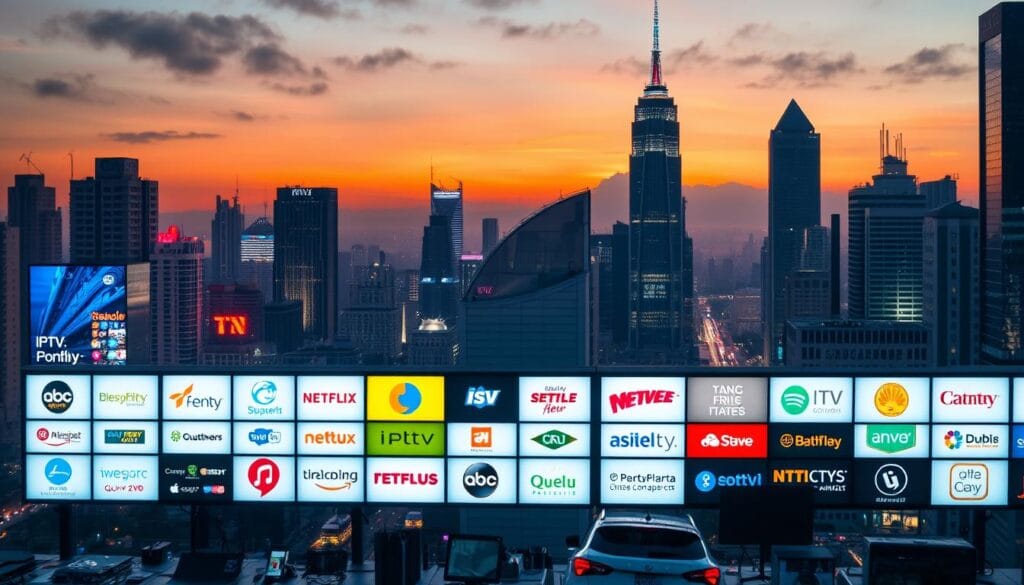IPTV legality and safety concerns subscription.
The rise of IPTV technology has transformed the way we consume television content, offering a wide range of channels and on-demand services. However, this shift has also raised important questions about the legal implications of using such services.
As the popularity of IPTV continues to grow, it’s essential to understand the potential risks associated with it. Ensuring that you’re using a service that operates within the bounds of the law is crucial to avoid any issues.
Staying informed about the safety concerns surrounding IPTV is vital for a secure viewing experience.
Key Takeaways
- Understanding the legal implications of IPTV services
- Recognizing the potential risks associated with IPTV
- Ensuring safe and secure IPTV usage
- Importance of choosing a reputable IPTV provider
- Awareness of the latest developments in IPTV technology
Understanding IPTV Technology
Understanding IPTV technology is crucial for grasping the future of television broadcasting. IPTV, or Internet Protocol Television, is a system where television services are delivered through the internet.
What Is IPTV and How Does It Work?
IPTV uses internet protocol to deliver TV programs and videos on demand. Unlike traditional satellite or cable TV, IPTV streams content directly over the internet, allowing for greater flexibility and customization. This technology enables users to access a wide range of content, including live TV, movies, and TV shows, using various devices such as smart TVs, computers, and mobile devices.

Key Features and Benefits of IPTV
The key features of IPTV include its ability to provide on-demand content, allowing users to watch what they want, when they want. IPTV services also often include features like pause, rewind, and fast-forward, enhancing the viewing experience.
Content Availability and Accessibility
One of the significant benefits of IPTV is its vast content availability. Users can access a broad range of channels and on-demand content, including international programs, sports, and movies. IPTV services are accessible on multiple devices, making it convenient for users to watch content anywhere, anytime.
On-Demand Viewing Options
IPTV offers on-demand viewing options, allowing users to select from a vast library of content. This feature is particularly appealing to those who prefer watching content at their own pace, rather than adhering to a broadcast schedule. On-demand services include catch-up TV, movies, and original content produced by the IPTV service providers.
The Current Landscape of IPTV Services
Understanding the current IPTV landscape requires examining both licensed and unlicensed providers. The IPTV market in the UK is diverse, offering a range of services to consumers.
Licensed vs. Unlicensed IPTV Providers
The IPTV market is divided into licensed and unlicensed providers. Licensed providers operate with legal permissions, offering content through legitimate channels. Unlicensed providers, however, stream content without proper authorization, posing risks to users, including malware and legal repercussions.
As stated by a cybersecurity expert, “Using unlicensed IPTV services can expose users to significant cybersecurity threats, including malware and data breaches.”
“The line between legitimate and illegitimate IPTV services is often blurred, making it challenging for consumers to make informed choices.”
Popular IPTV Providers in the UK Market
Several IPTV providers are popular in the UK, offering various services. Some of the well-known providers include:
- BT TV
- Virgin Media
- Now TV
These providers offer different subscription models and content libraries.
Subscription Models and Pricing
IPTV providers in the UK offer various subscription plans, ranging from basic packages to premium services. Pricing varies significantly, with some providers offering monthly subscriptions and others providing annual plans.
| Provider | Basic Plan | Premium Plan |
|---|---|---|
| BT TV | £25/month | £40/month |
| Virgin Media | £30/month | £50/month |
Content Libraries and Offerings
The content availability varies among IPTV providers. Some offer extensive libraries, including sports channels, movies, and TV shows. For instance, BT TV offers a wide range of channels, including sports and entertainment.

When choosing an IPTV provider, it’s essential to consider both the subscription models and the content offerings to ensure they meet your viewing needs.
IPTV Legality: What You Need to Know
Navigating the legal aspects of IPTV is essential for a safe and compliant viewing experience. The legal landscape surrounding IPTV services is complex, involving various laws and regulations.
Legal Framework in the United Kingdom
The UK has a robust legal framework governing IPTV services, primarily focusing on copyright protection and intellectual property rights.
Copyright, Designs and Patents Act
The Copyright, Designs and Patents Act 1988 is a cornerstone of UK copyright law, providing protection for original literary, dramatic, musical, and artistic works. IPTV providers must comply with this act to avoid copyright infringement.
Digital Economy Act Implications
The Digital Economy Act 2010 further regulates IPTV services by addressing online copyright infringement. It empowers rights holders to take action against infringing content and requires IPTV providers to implement measures to prevent copyright infringement.
Copyright Infringement and Intellectual Property Laws
Copyright infringement is a significant concern for IPTV services, as it involves the unauthorized distribution of copyrighted content. IPTV providers must adhere to intellectual property laws to ensure they are not infringing on the rights of content creators.
Content Licensing Requirements
To legally offer copyrighted content, IPTV providers must obtain the necessary licenses from rights holders. This involves negotiating content licensing agreements that cover the distribution rights for specific content.
Broadcast Rights and Restrictions
IPTV services must also comply with broadcast rights and restrictions, which dictate how and where content can be distributed. Understanding these rights is crucial for IPTV providers to avoid legal repercussions.
In conclusion, understanding the legal framework governing IPTV in the UK is crucial for both providers and consumers. By adhering to copyright laws and obtaining necessary licenses, IPTV services can operate legally and provide a safe viewing experience.
Legal IPTV Options in the UK
The landscape of IPTV in the UK includes a range of legal services that cater to different viewer preferences. These services provide consumers with a variety of choices, ensuring that they can access their preferred content legally and safely.
Authorized IPTV Service Providers
Authorized IPTV service providers in the UK offer a range of services, from traditional broadcasters to specialized IPTV platforms. These providers have obtained the necessary licenses to distribute content, ensuring that consumers are accessing material legally.
Traditional Broadcasters' IPTV Services
Traditional broadcasters such as BT TV and Virgin Media offer IPTV services as part of their packages. These services provide access to live TV, catch-up services, and on-demand content, all within a legal framework.
Specialized IPTV Platforms
Specialized IPTV platforms like Now TV and TalkTalk TV offer flexible viewing options. These services allow consumers to stream content without the need for a traditional TV subscription, providing a legal alternative to mainstream broadcasting.
Subscription-Based Legitimate Services
Subscription-based IPTV services provide consumers with access to a wide range of content for a monthly fee. These services are legitimate and offer various packages to suit different viewer needs.
Premium Content Packages
Premium content packages are available through services like Amazon Prime Video and BritBox. These packages offer exclusive content, including original series and movies, for an additional fee.
Free and Ad-Supported Legal Options
Free and ad-supported services, such as Pluto TV and STV Player, offer legal content with advertisements. These services provide an alternative for viewers who do not wish to subscribe to a paid service.
| Service Provider | Type | Content Offerings |
|---|---|---|
| BT TV | Traditional Broadcaster | Live TV, Catch-up, On-demand |
| Now TV | Specialized IPTV | Live TV, On-demand |
| Amazon Prime Video | Subscription-Based | Original Series, Movies |
| Pluto TV | Free and Ad-Supported | On-demand Content, Live TV |
Safety Concerns When Using IPTV Services
Using IPTV services can expose users to various safety risks, including malware and data privacy issues. As the popularity of IPTV continues to grow, it’s crucial for users to understand these risks to protect themselves.
Malware and Cybersecurity Risks
One of the significant safety concerns with IPTV services is the risk of malware and cybersecurity threats. Unauthorized IPTV providers often host malicious software that can compromise users’ devices.
Common Threats in Unauthorized Services
Unauthorized IPTV services are breeding grounds for malware, including viruses, Trojans, and ransomware. These threats can lead to data theft, financial loss, and compromised device security.
Device Vulnerability Issues
Devices used for IPTV streaming can be vulnerable to cyberattacks if not properly secured. Regular software updates and the use of antivirus software are crucial in mitigating these risks.
Data Privacy and Personal Information Risks
Besides malware, another significant concern is the risk to data privacy and personal information. IPTV services, especially unauthorized ones, may not adhere to strict data protection standards.
User Tracking Concerns
Some IPTV services may engage in user tracking, collecting viewing habits and personal data without consent. This information can be sold to third parties or used for targeted advertising.
Payment Security Issues
When using IPTV services, users often need to provide payment information. Insecure payment gateways can lead to financial fraud and identity theft.
| Risk | Description | Mitigation |
|---|---|---|
| Malware | Malicious software that can compromise device security. | Use antivirus software, keep software updated. |
| Data Privacy Issues | Unauthorized collection and use of personal data. | Use secure, authorized IPTV services; monitor data usage. |
| Payment Security Issues | Insecure payment processing leading to financial fraud. | Use secure payment methods, avoid unauthorized services. |
Technical Risks of Unauthorized IPTV
Technical risks are inherent in unauthorized IPTV services, impacting both quality and reliability. These risks can significantly affect the user experience, making it essential for consumers to understand the potential issues.
Quality and Reliability Problems
Unauthorized IPTV services often suffer from quality and reliability problems, which can manifest in various ways. Users may experience disruptions to their service, affecting their ability to enjoy uninterrupted streaming.
Streaming Interruptions and Buffering
One common issue is streaming interruptions and buffering, which can be frustrating for users. These interruptions can occur due to server overload or poor infrastructure.
Resolution and Audio Quality Issues
Additionally, resolution and audio quality issues are prevalent. Users may encounter poor video resolution or audio sync problems, detracting from their viewing experience.
Lack of Customer Support and Service Guarantees
Another significant risk is the lack of customer support and service guarantees. Unauthorized IPTV providers often do not offer reliable customer service, leaving users to resolve issues on their own.
Service Discontinuation Without Notice
Users are also at risk of service discontinuation without notice. Unauthorized providers can shut down their services at any time, leaving users without access to their IPTV streams.
Troubleshooting Challenges
Furthermore, troubleshooting challenges are common due to the lack of support. Users may struggle to resolve technical issues, leading to a poor overall experience.
Legal Consequences of Using Illegal IPTV Services
UK authorities are taking a strong stance against illegal IPTV services, affecting both providers and users. The use of such services can lead to significant legal consequences, impacting individuals and businesses alike.
Potential Penalties for Users in the UK
Users of illegal IPTV services in the UK face potential penalties that can be financially crippling. These penalties are enforced to deter copyright infringement and protect intellectual property rights.
Individual User Liability
Individuals using illegal IPTV services can be held liable for copyright infringement. This liability can result in significant fines, potentially amounting to thousands of pounds.
ISP Monitoring and Warning Systems
Internet Service Providers (ISPs) in the UK are required to monitor and report illegal IPTV activities. Users found to be using such services may receive warnings or have their internet services throttled or terminated.
Recent Legal Actions Against IPTV Users and Providers
The UK has seen a rise in legal actions against both IPTV users and providers. These actions are part of a broader effort to curb copyright infringement and protect content creators’ rights.
Major UK Court Cases and Outcomes
Several high-profile court cases have resulted in substantial penalties for individuals and businesses involved in illegal IPTV services. These cases serve as a deterrent to others considering similar activities.
| Case | Outcome | Penalty |
|---|---|---|
| Case 1: IPTV Provider | Guilty of copyright infringement | £100,000 fine |
| Case 2: Individual User | Found liable for illegal streaming | £5,000 fine |
| Case 3: IPTV Service Operator | Convicted of facilitating copyright infringement | £200,000 fine and 2-year imprisonment |
International Enforcement Cooperation
There is growing international cooperation to combat illegal IPTV services. Countries are working together to share intelligence and coordinate efforts to dismantle global IPTV piracy networks.
Enhancing Security When Using Legal IPTV Services
Enhancing your IPTV streaming experience requires a focus on security measures that protect your device and personal data. As the popularity of IPTV continues to grow, so does the importance of securing your streaming activities.
Best Practices for Safe IPTV Streaming
To stream IPTV safely, it’s essential to adopt best practices that minimize risks. One key measure is using VPNs (Virtual Private Networks) to encrypt your internet connection, making it harder for third parties to intercept your data.
Using VPNs and Security Software
Utilizing a VPN is crucial for secure IPTV streaming. Additionally, installing reputable security software can protect your devices from malware and other cyber threats.
Secure Payment Methods
When subscribing to IPTV services, using secure payment methods such as credit cards or PayPal, which offer some level of buyer protection, is advisable.
Compatible Devices and Setup Considerations
Choosing the right devices and configuring them correctly is vital for a secure and enjoyable IPTV experience. This includes selecting devices that are compatible with your IPTV service.
Recommended IPTV Streaming Devices
Devices such as smart TVs, Android boxes, and dedicated IPTV players are popular choices. Ensure that your device is compatible with your IPTV service provider.
Network Optimization for Better Performance
Optimizing your home network can significantly improve your IPTV streaming quality. This can involve upgrading your internet plan, using wired connections, and configuring your router for optimal performance.
Conclusion
Understanding the intricacies of IPTV legality and safety concerns is crucial for a secure and enjoyable IPTV viewing experience. Throughout this article, we have explored the current landscape of IPTV services, the legal framework in the UK, and the potential risks associated with using unauthorized IPTV providers.
To ensure a safe and legal IPTV viewing experience, it is essential to opt for authorized IPTV service providers and subscription-based legitimate services. By doing so, users can mitigate the risks of malware, cybersecurity threats, and data privacy issues.
Ultimately, being aware of the iptv legality and iptv safety concerns can significantly enhance your iptv viewing experience. By choosing legitimate services and following best practices for safe IPTV streaming, users in the UK can enjoy their favorite content without compromising their personal data or exposing themselves to potential legal consequences.
FAQ
What is IPTV and how does it work?
IPTV, or Internet Protocol Television, is a service that delivers television content over the internet. It works by streaming content directly to your device, allowing for a more personalized viewing experience.
What are the key features of IPTV services?
IPTV services typically offer a range of features, including on-demand content, catch-up TV, and the ability to watch live television. Some services also offer additional features, such as the ability to pause and rewind live TV.
Are all IPTV services legal?
No, not all IPTV services are legal. Some services may offer copyrighted content without the necessary licenses or permissions, making them illegal. It’s essential to choose a licensed and authorized IPTV provider to avoid any potential legal issues.
What are the safety concerns associated with using IPTV services?
When using IPTV services, there are several safety concerns to be aware of, including the risk of malware and cybersecurity threats, particularly when using unauthorized services. Additionally, there may be data privacy and personal information risks associated with some IPTV providers.
How can I enhance my security when using legal IPTV services?
To enhance your security when using legal IPTV services, consider using a VPN and security software to protect your device and personal data. Additionally, use secure payment methods and ensure your device and network are optimized for IPTV streaming.
What are the technical risks of using unauthorized IPTV services?
Unauthorized IPTV services can pose several technical risks, including quality and reliability problems, such as streaming interruptions and buffering. Additionally, these services often lack customer support and service guarantees, making it challenging to troubleshoot issues.
What are the legal consequences of using illegal IPTV services?
Using illegal IPTV services can result in potential penalties, including fines and other legal consequences. In the UK, individual users may be liable for copyright infringement, and ISPs may monitor and issue warnings to users accessing illegal IPTV services.
How can I check if my IPTV service is compatible with my device?
To check if your IPTV service is compatible with your device, refer to the service provider’s list of supported devices or check the device manufacturer’s specifications to ensure compatibility with IPTV streaming.
What are the benefits of using a licensed IPTV provider?
Using a licensed IPTV provider offers several benefits, including access to high-quality, legitimate content, improved security, and reliable customer support. Licensed providers also ensure compliance with copyright and intellectual property laws.





